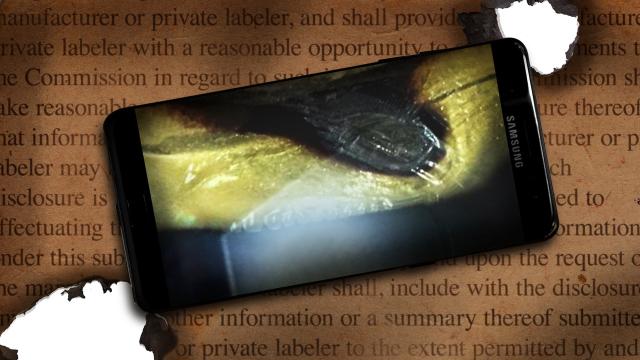Yesterday, the US Consumer Product Safety Commission (CPSC) issued a statement warning consumers to stop using the Galaxy Note 7 smartphone, even if they’d gotten a replacement, because the phones are still overheating and causing fires. Thankfully, Samsung was OK with the CPSC’s statement — because if the company didn’t like it, the statement wouldn’t have been released.
Illustration by Sam Woolley from a photo by Getty Images
Because of Section 6B of the Consumer Product Safety Act, added by Congress in 1981, companies have the power to restrict and even edit what the CPSC can tell the public about their products. Americans are generally under the impression that US regulatory agencies have relatively unlimited freedom to protect consumers. But US agencies like the CPSC, tasked with protecting people from things like toppling dressers and exploding smartphones, are often at the mercy of the companies they’re supposed to be watching.
“Our agency is not permitted to discuss a product if we don’t give the company 10 days notice on what we want to say,” Scott Wolfson, Communications Director at the CPSC, said over the phone.
If the company objects to whatever the CPSC wants to tell the public, the company can kick the statement back to the agency, which has another five days to negotiate with the company about wording.
The section “is unparalleled in government,” said Rachel Weintraub of the Consumer Federation of America, a nonprofit consumer advocacy organisation. “Normally what happens in the process of negotiating a recall, every word of the release is negotiated. Consumer groups have long been fighting to get rid of this provision or limit its very broad scope.”
In the US, Samsung initially had an “unofficial recall” of the Galaxy Note 7, back when there were just 35 reported explosions. Only it wasn’t a recall at all, since the company didn’t get the CPSC involved. As a result, the agency couldn’t warn consumers about what was happening in a timely manner. Samsung’s “unofficial recall” subsequently hampered the agency’s ability to get the defective phone off shelves.
“What should have happened is the company comes to us right away and we can quickly turn around, once we get all the information we need, the proper recall,” CPSC Chairman Elliot Kaye said in September after Samsung finally issued a proper recall. Samsung announced yesterday that it would finally stop making the Galaxy Note 7.
Without guidance from CPSC, other agencies, like the FAA, were paralysed. When the exploding Galaxy Note story broke, I contacted the FAA about whether the phones were still allowed on aeroplanes. Because there hadn’t been a proper recall yet, the FAA couldn’t flatly say that the explosive smartphones shouldn’t be allowed on planes.
A handful of organisations are fighting for the CPSC to speak more openly about product safety, without company approval. But companies have their own lobbying groups to make sure that this doesn’t happen. American organisations like the Juvenile Products Manufacturers Association and the National Association of Manufacturers fight any effort to give the CPSC more independence. And they have deep pockets: We don’t know how much these groups spend on this particular issue, but The National Association of Manufacturers spent almost $US17 million ($22.5 million) on general lobbying efforts last year alone.
I’ve reached out to both the Juvenile Products Manufacturers Association (JPMA) and the National Association of Manufacturers (NAM). JPMA did not supply a comment by deadline, and I’ve yet to hear back from NAM at time of writing.
Most of the efforts from consumer advocacy groups, like the Consumer Federation of America, have failed. But the CFA was able to get a government-funded website created that gives consumers more info about dangerous products. That site is called Saferproducts.gov.
“Before [Saferproducts.gov] went live, if the consumer was researching a particular product, there was no database that had that information,” Weintraub tells me. “You could look up products that had been recalled with general information from CPSC. But this at least now provides a way to inform consumers.”
The long-term goal is to get Section 6B of the Consumer Product Safety Act tamed, so that the CPSC can actually warn consumers without being forced to ask companies for permission. “6B is fully in effect and it entirely constrains the agency’s ability to talk about a specific product or a specific hazard unless that entity gives permission to the agency to communicate,” Weintraub said.
CPSC isn’t only restricted in public. The agency even has to tell companies when a Freedom of Information Act request has been submitted to the agency about them. As a frequent FOIA requester, it’s a safe bet that my name is about to get passed to a lot of different companies this week.
“It’s a pretty broad anti-transparency provision,” Weintraub says of Section 6B. “There’s a proposed rule to update 6B, but Industry has been adamant in opposition to what we think is a very modest rule.”
